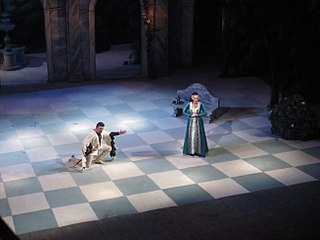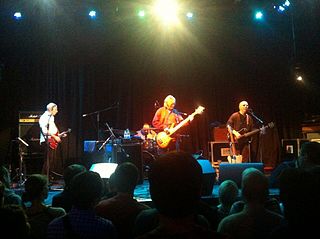
The Queen of Spades or Pique Dame, Op. 68 is an opera in three acts by Pyotr Ilyich Tchaikovsky to a Russian libretto by the composer's brother Modest Tchaikovsky, based on the 1834 novella of the same name by Alexander Pushkin, but with a dramatically altered plot. The premiere took place in 1890 at the Mariinsky Theatre in Saint Petersburg, Russia.

Iolanta, Op. 69, is a lyric opera in one act by Pyotr Tchaikovsky. It was the last opera he composed. The libretto was written by the composer's brother Modest Tchaikovsky, and is based on the Danish play Kong Renés Datter by Henrik Hertz, a romanticised account of the life of Yolande de Bar. In the original Danish play, the spelling of the princess's name was "Iolanthe", later adopted for the otherwise unrelated Gilbert and Sullivan operetta of that name. The play was translated by Fyodor Miller and adapted by Vladimir Zotov. The opera received its premiere on 18 December 1892 in Saint Petersburg.
"Kalinka" is a Russian folk-style song written in 1860 by the composer and folklorist Ivan Larionov and first performed in Saratov as part of a theatrical entertainment that he had composed. Soon it was added to the repertory of a folk choral group.

Fabrika is a Russian-Ukrainian pop girl group, originally from Moscow. Initially a four-piece, Fabrika was created from four female participants from the first season of the Russian musical reality show Fabrika Zvyozd in 2002, and included Irina Toneva, Sati Kazanova, Alexandra Savelyeva and Maria Alalykina. The line-up has had several profound changes since then. Long time a fully Russian group, Fabrika later acquired two Ukrainian-born members, Oleksandra Popova (2014-2021) and Mariya Honcharuk (2019-2022). As of 2019, Toneva was the only original member of the line-up.

Voskreseniye is a Russian rock band.
Pyotr Ilyich Tchaikovsky composed a set of six romances for voice and piano, Op. 6, in late 1869; the last of these songs is the melancholy "None but the Lonely Heart", a setting of Lev Mei's poem "The Harpist's Song" which in turn was a translation of "Nur wer die Sehnsucht kennt" from Goethe's Wilhelm Meister's Apprenticeship.

Dmitri Aleksandrovich Hvorostovsky was a Russian operatic baritone.

Andrey Vyacheslavovich Lysikov is a Russian musical artist, singer, songwriter, poet and rapper, known by his stage name Dolphin. He won the award of best artist at the 2004 MTV Russian Music Awards. He also played at the Live 8 Russia concert.

Constantine Garrievich Orbelian, Jr. is an American conductor and pianist of Armenian and Russian descent. He is named after his paternal uncle Konstantin Orbelyan, a major Armenian composer. Constantine Orbelian is currently music director and Principal Conductor of the New York City Opera.

Leonid Petrovich Derbenyov was a Russian poet and lyricist widely regarded as one of the stalwarts of the 20th century Soviet and Russian pop music.
"Shine, Shine, My Star" is an acclaimed Russian romance.

Evgeny Mikhailovich Belyaev, also written as Yevgeny Belyayev, was a Russian tenor soloist of the Alexandrov Ensemble under Boris Alexandrov. He is remembered in the Soviet Union as the Russian Nightingale and in the West as one of the definitive singers of Kalinka.

Leonid Mikhailovich Kharitonov was a Soviet and Russian bass-baritone singer. He was honored with People's Artist of the RSFSR and Honored Artist of RSFSR. In the West he was noted for his 1965 video of The Song of the Volga Boatmen.
Pyotr Petrovich Bulakhov was a Russian composer of mostly Russian chanson. He's considered a notable composer due to the chanson he composed having reached critical popularity during his lifetime.

Where are You, my Brothers? is a 2003 album of Russian-language songs from World War II recorded by baritone Dmitry Hvorostovsky and conductor Constantine Orbelian for Delos Productions. The album was released in Russia as Songs of the War Years. It was based on a concert at the Kremlin Palace in Moscow. A video of the concert and 13 of the songs was released on the American VAI label. The repertoire of the concert is the very core of the Russian war song genre and the sound and video releases were accompanied by booklet essays and sung texts and translations.

"I Loved You" is a poem by Alexander Pushkin written in 1829 and published in 1830. It has been described as "the quintessential statement of the theme of lost love" in Russian poetry, and an example of Pushkin's respectful attitude towards women.

Chay Vdvoyom was a Russian pop music band, formed by Denis Klyaver and Stanislav Kostyushkin, which existed from 1994 until 2012.
The 27th Infantry Division was an infantry formation of the Russian Imperial Army. It was a part of the 3rd Army Corps.
The 4th Cavalry Division was a cavalry formation of the Russian Imperial Army.













